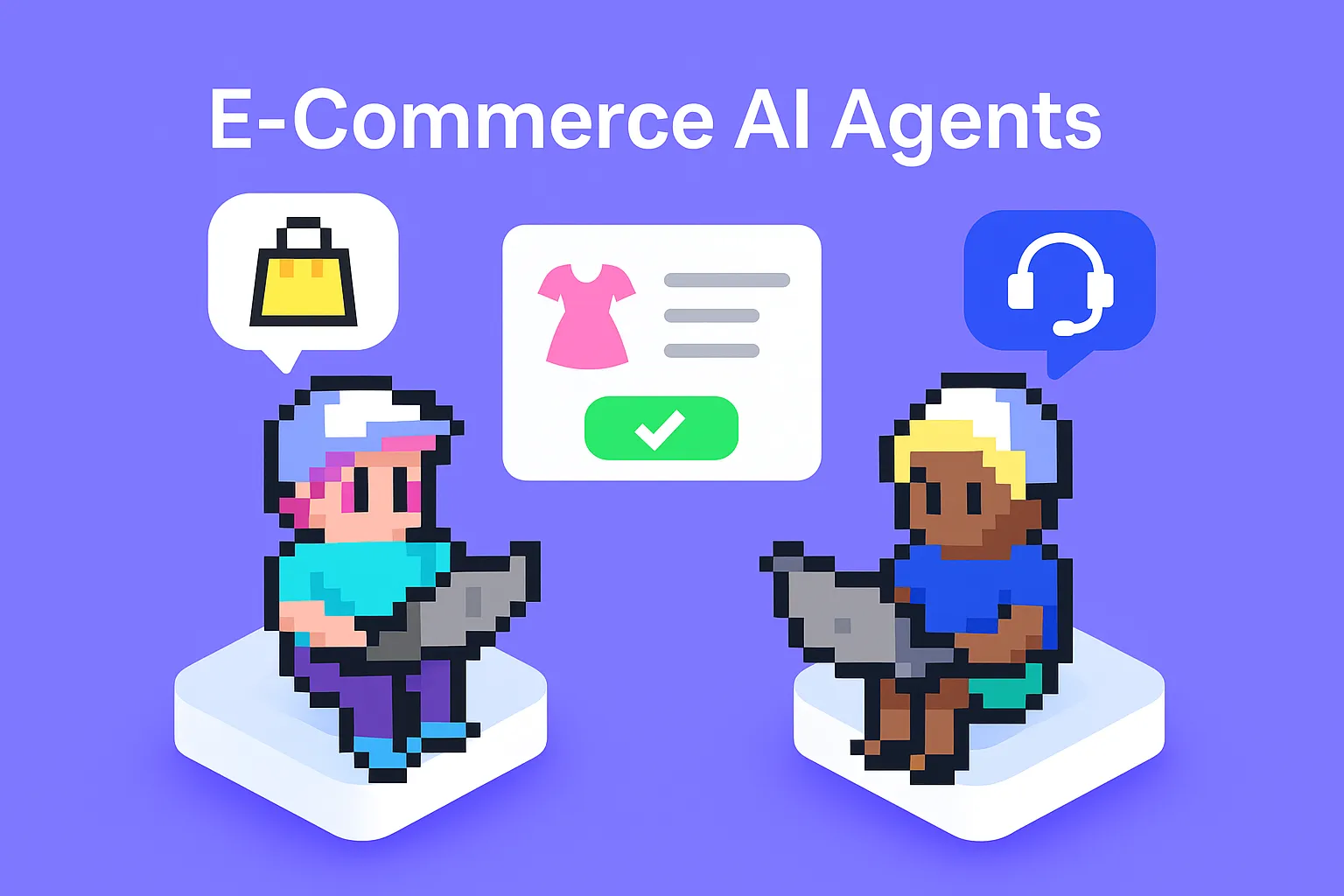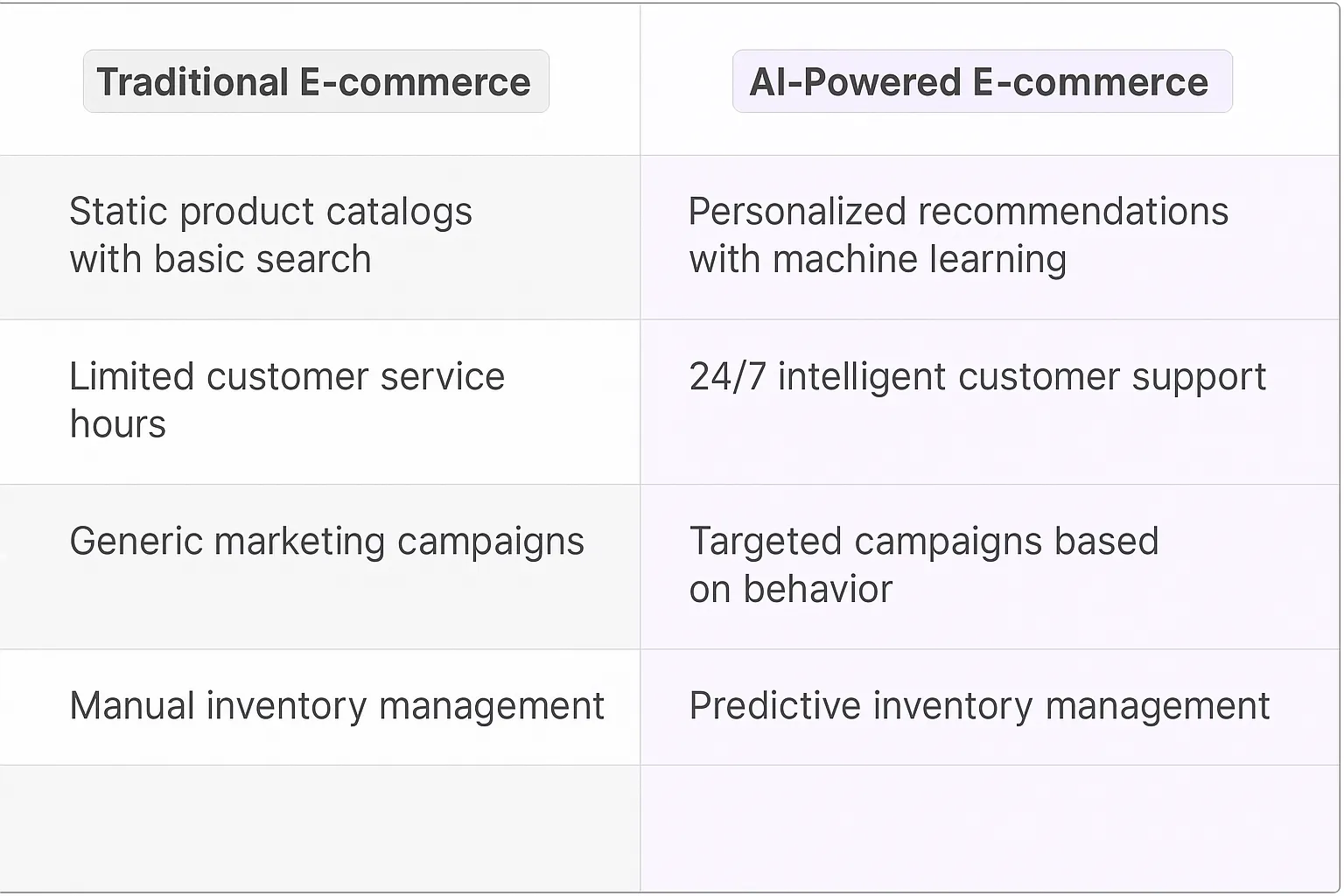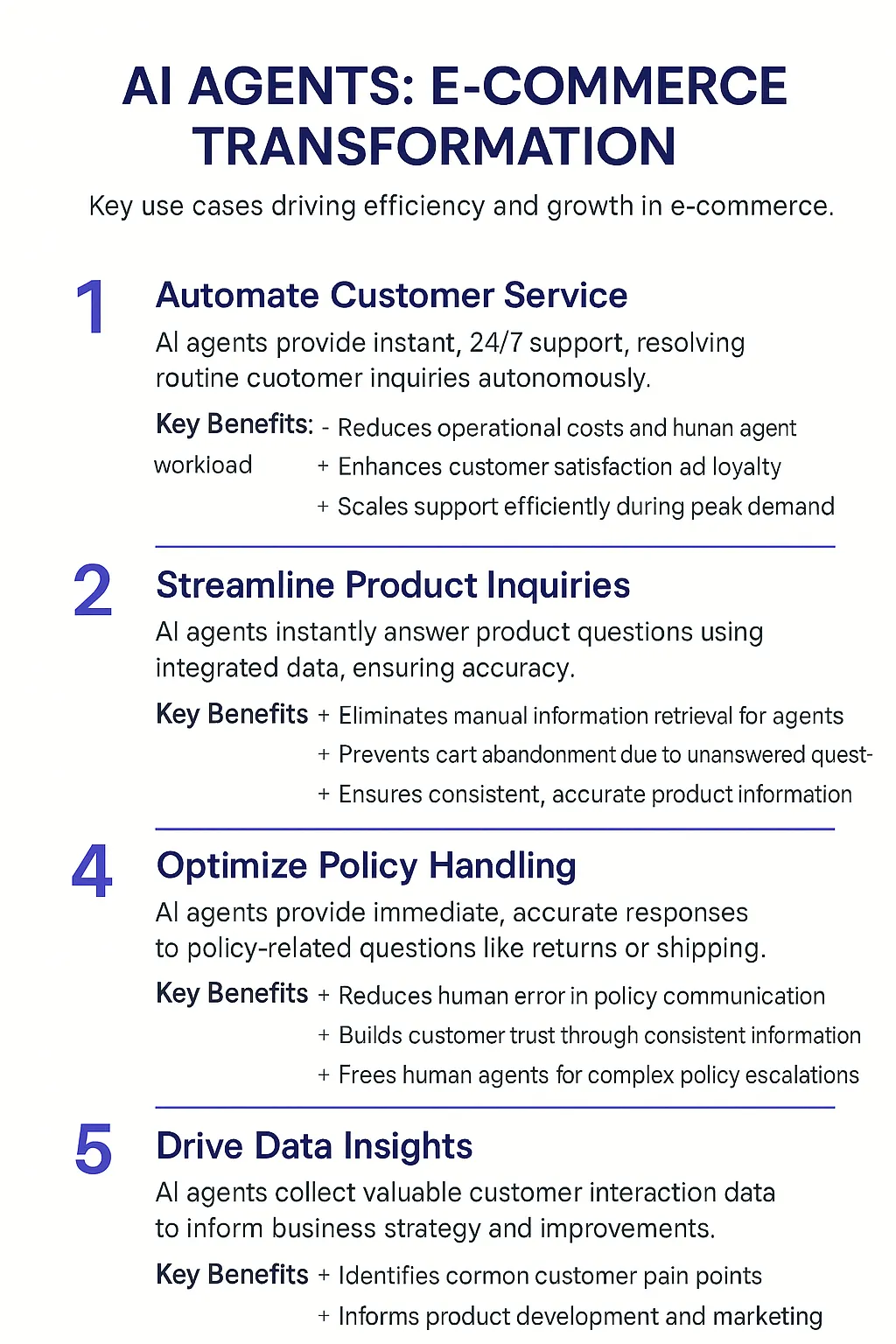E-commerce AI Agents
The Digital Marketplace Revolution
E-commerce, short for electronic commerce, is the buying and selling of goods and services over the internet. It's the digital bazaar where businesses and consumers meet, transact, and interact without physical boundaries. E-commerce has evolved from simple online catalogs to complex, data-driven platforms that cater to the ever-changing needs of digital shoppers.
E-commerce platforms are characterized by their ability to handle transactions securely, manage inventory in real-time, and provide customer support at scale. They often include features like product search and filtering, shopping carts, payment processing, and order tracking. Advanced e-commerce systems also incorporate personalization engines, recommendation systems, and multi-channel integration to create seamless shopping experiences across devices and platforms.

Benefits of AI Agents for E-commerce
What would have been used before AI Agents?
Before AI agents hit the e-commerce scene, online stores were like digital ghost towns after hours. You'd have static FAQs, clunky search functions, and maybe a "Contact Us" form that felt like shouting into the void. Customer service? That was a 9-to-5 gig, leaving late-night shoppers in the lurch. Personalization was more "best guess" than "best fit," and inventory management was a constant game of catch-up.
Marketers were flying blind, relying on broad demographic data and gut feelings. They'd blast out one-size-fits-all campaigns and cross their fingers. Product recommendations? More like product roulette. And don't get me started on fraud detection – it was like playing whack-a-mole with increasingly sophisticated bad actors.
What are the benefits of AI Agents?
Enter AI agents, the digital teammates that never sleep. These bad boys are transforming e-commerce from a transactional platform to an intelligent ecosystem. They're not just filling gaps; they're creating new possibilities that we couldn't even imagine before.
First off, customer service gets a major upgrade. AI agents are like having a army of hyper-competent, infinitely patient sales associates. They're handling queries 24/7, in multiple languages, and they're getting smarter with every interaction. They're not just answering questions; they're anticipating needs, guiding purchases, and even handling post-sale support.
On the personalization front, AI agents are turning the firehose of customer data into a precision instrument. They're analyzing browsing patterns, purchase history, and even social media activity to create hyper-personalized experiences. It's like having a personal shopper for every single customer, but at scale.
For inventory management, AI agents are like crystal balls. They're crunching numbers, analyzing trends, and making predictions that help businesses stay ahead of demand. No more overstocking or stockouts – just smooth, efficient operations.
In marketing, AI agents are the secret weapon. They're crafting targeted campaigns, optimizing ad spend, and even generating content. They're turning marketing from a shotgun approach to a sniper's precision.
And let's talk about fraud detection. AI agents are like digital bloodhounds, sniffing out suspicious activity in real-time. They're not just reacting to known threats; they're identifying new patterns and adapting on the fly.
But here's the kicker – all of these benefits compound. Each interaction, each transaction, each data point makes the AI smarter and more effective. It's a virtuous cycle of improvement that's pushing e-commerce to new heights.
In the end, AI agents aren't just tools; they're game-changers. They're turning e-commerce from a digital storefront into an intelligent, adaptive, and deeply personalized shopping experience. And we're just scratching the surface of what's possible. Buckle up, folks – the e-commerce revolution is just getting started.

Potential Use Cases of AI Agents in E-commerce
Processes
E-commerce AI agents are reshaping the online retail landscape, bringing a level of sophistication that's hard to ignore. These digital teammates are not just fancy chatbots; they're becoming integral parts of the e-commerce ecosystem. Let's dive into some of the processes where they're making waves:
- Inventory Management: AI agents can predict stock levels, automate reordering, and optimize warehouse layouts. They're like having a team of inventory wizards working 24/7.
- Pricing Optimization: These digital teammates can analyze market trends, competitor pricing, and demand patterns to suggest optimal pricing strategies. It's like having a pricing guru who never sleeps.
- Customer Segmentation: AI agents can slice and dice customer data to create hyper-targeted segments. This isn't just basic demographics; we're talking about behavior-based, predictive segmentation that feels almost clairvoyant.
- Supply Chain Optimization: From predicting shipping delays to optimizing routes, AI agents are becoming the backbone of efficient e-commerce logistics.
- Fraud Detection: These digital teammates can spot fraudulent activities faster than you can say "chargeback." They're constantly learning new fraud patterns, staying one step ahead of the bad actors.
Tasks
Now, let's zoom in on some specific tasks where e-commerce AI agents are proving their worth:
- Product Recommendations: AI agents are getting scary good at suggesting products you didn't even know you wanted. They're analyzing browsing history, purchase patterns, and even social media activity to serve up recommendations that feel almost telepathic.
- Customer Service Triage: These digital teammates can handle the front lines of customer inquiries, resolving simple issues and routing complex ones to human agents. It's like having a customer service army that never gets tired or cranky.
- Visual Search: AI agents are powering visual search capabilities that let customers find products by uploading images. It's like having a personal shopper who can find anything based on a picture.
- Dynamic Content Creation: From product descriptions to email subject lines, AI agents are churning out content that's tailored to individual users. It's content marketing on a whole new level.
- Return Prediction: These digital teammates can analyze purchase patterns and product attributes to predict which items are likely to be returned. It's like having a crystal ball for your reverse logistics.
- Review Analysis: AI agents can sift through thousands of customer reviews, extracting insights and flagging issues that need attention. It's like having a team of analysts working around the clock to understand customer sentiment.
The potential of AI agents in e-commerce is massive. We're moving beyond simple automation into a realm where these digital teammates are making complex decisions and predictions that can significantly impact the bottom line. As these AI agents continue to evolve, we'll likely see even more sophisticated use cases emerge, further blurring the lines between human and machine capabilities in the e-commerce space.

Industry Use Cases: E-commerce AI Agents in Action
E-commerce AI agents are reshaping online retail, offering capabilities that extend far beyond basic automation. These digital teammates are becoming indispensable across various sectors of the e-commerce ecosystem. Let's dive into some specific, high-impact use cases that demonstrate how AI agents are transforming workflows and processes in online retail.
From personalized shopping experiences to inventory management, these AI-powered solutions are tackling complex challenges with remarkable efficiency. They're not just handling routine tasks; they're actively contributing to strategic decision-making and customer engagement. As we explore these use cases, you'll see how e-commerce AI agents are becoming integral to competitive advantage in the digital marketplace.
Fashion Retail: AI-Powered Personal Shoppers
Let's talk about how e-commerce AI agents are reshaping the fashion retail landscape. These digital teammates are essentially becoming the new-age personal shoppers, but with superpowers.
Think about it. When you walk into a high-end boutique, you're greeted by a stylist who knows the inventory inside out, understands current trends, and can gauge your personal style within minutes. Now, imagine that experience, but available 24/7, to millions of customers simultaneously, and with an encyclopedic knowledge of not just the current inventory, but every item the store has ever sold.
That's what AI agents are bringing to online fashion retail. They're not just product recommenders; they're style advisors, trend analysts, and personal shoppers rolled into one. These digital teammates can analyze a customer's browsing history, past purchases, wishlists, and even social media activity to understand their style preferences at a granular level.
But here's where it gets interesting. These AI agents don't just match products to preferences; they understand context. They know that the floral dress a customer is eyeing might be for a summer wedding, so they'll suggest complementary accessories, shoes, and even makeup looks. They can create entire outfits, mixing and matching items from the store's inventory in ways that a human stylist might never think of.
And let's not forget about the operational efficiencies. These AI agents can predict trends, inform inventory decisions, and even help with pricing strategies. They're constantly learning from every interaction, getting smarter with each customer they serve.
The result? A hyper-personalized shopping experience that feels intimate and curated, even when it's happening at scale. It's like having a personal stylist in your pocket, one that knows you better than you know yourself.
This isn't just about increasing sales (although that's certainly a nice side effect). It's about fundamentally changing how people discover and interact with fashion online. It's about making online shopping feel less like a transaction and more like an experience.
In the world of fashion retail, AI agents aren't just tools; they're the new tastemakers. And they're redefining what it means to shop in the digital age.
Travel Industry: AI Concierges Redefining Vacation Planning
The travel industry is ripe for disruption, and AI agents are leading the charge as next-gen digital concierges. These aren't your run-of-the-mill chatbots; they're sophisticated travel agent that are transforming how we plan, book, and experience vacations.
Consider the traditional travel planning process. It's a time-consuming ordeal of comparing flights, scouring hotel reviews, and piecing together an itinerary that often feels more like work than the prelude to a relaxing getaway. Enter AI concierges - they're flipping this model on its head.
These digital teammates tap into vast databases of travel information, real-time pricing, user reviews, and even social media trends to craft personalized travel experiences. They're not just booking agents; they're part travel guru, part local expert, and part personal assistant.
What sets these AI concierges apart is their ability to understand context and nuance. They don't just know that you want to visit Paris; they understand that you're a history buff with a penchant for off-the-beaten-path experiences and a strict gluten-free diet. Armed with this knowledge, they can suggest a boutique hotel in Le Marais, book a private tour of lesser-known historical sites, and reserve tables at the best gluten-free bistros in the city.
But the real magic happens in their ability to adapt on the fly. Flight delayed? The AI concierge is already rebooking your connecting flights and adjusting your hotel check-in. Sudden rainstorm ruining your beach day? It's already suggested indoor activities and made reservations at a highly-rated local spa.
These AI agents are also changing the game for travel companies. They're providing unprecedented insights into customer preferences, helping to optimize pricing strategies, and even predicting travel trends before they hit mainstream consciousness.
The impact on user experience is profound. Travel planning shifts from a stressful chore to an exciting part of the journey. It's like having a seasoned travel agent, a knowledgeable local guide, and a personal assistant in your pocket, available 24/7, and intimately familiar with your preferences.
We're moving towards a future where AI concierges don't just plan trips; they curate experiences. They're not replacing human connection in travel, but enhancing it by freeing travelers to focus on what matters - the joy of discovery and the thrill of new experiences.
In the travel industry, AI agents aren't just tools for booking; they're the architects of unforgettable journeys. And they're rewriting the rules of how we explore the world.
Considerations
Technical Challenges
Implementing e-commerce AI agents isn't a walk in the park. It's more like trying to teach a toddler quantum physics while juggling flaming torches. The first hurdle? Data integration. Your AI needs to slurp up data from multiple sources - inventory systems, customer databases, payment gateways - and make sense of it all in real-time. It's like asking someone to simultaneously watch every security camera in a mall and spot shoplifters.
Then there's the natural language processing (NLP) conundrum. E-commerce queries can be as diverse as the products you're selling. One customer might ask for "that blue thingy that holds my coffee," while another wants "a caffeinated liquid containment unit in azure." Your AI needs to decipher these cryptic messages and match them to actual products. It's like playing a never-ending game of charades with a million players.
Let's not forget about scalability. Your AI agent needs to handle Black Friday levels of traffic on a Tuesday afternoon without breaking a sweat. It's like expecting a corner lemonade stand to suddenly serve the entire population of New York City.
Operational Challenges
On the operational front, things get even spicier. First up: training. Your AI agent needs to learn your product catalog, pricing strategies, and customer service policies. It's like onboarding a new employee, except this one never sleeps, never takes breaks, and can handle thousands of customers simultaneously. The catch? If you train it wrong, those thousands of interactions could go south faster than a penguin on a waterslide.
Then there's the delicate dance of human-AI collaboration. Your human team needs to work alongside these digital teammates without feeling like they're in a sci-fi dystopia. It's about finding that sweet spot where AI handles the grunt work, freeing up humans for complex problem-solving and relationship building. Get it wrong, and you'll have a workforce feeling as obsolete as a floppy disk in a cloud storage world.
Lastly, there's the ever-evolving landscape of e-commerce itself. Your AI needs to keep up with changing trends, new products, and shifting customer expectations. It's like trying to hit a moving target while riding a unicycle on a tightrope. In a hurricane.
Implementing e-commerce AI agents is a high-stakes game. Get it right, and you're looking at a 24/7 sales force that never calls in sick. Get it wrong, and you might find yourself longing for the days of "Your call is important to us" hold music. The key? Start small, iterate fast, and always keep one eye on the horizon. Because in the world of e-commerce AI, the only constant is change.
The AI-Powered Future of Online Retail
E-commerce AI agents are not just a trend; they're the future of online retail. These digital teammates are redefining what's possible in customer service, personalization, and operational efficiency. As AI technology continues to advance, we can expect even more sophisticated applications that blur the lines between human and machine capabilities. The e-commerce landscape is evolving rapidly, and businesses that embrace AI agents will be best positioned to thrive in this new era of intelligent online retail. The revolution is here, and it's powered by AI.













